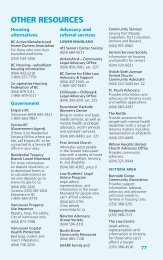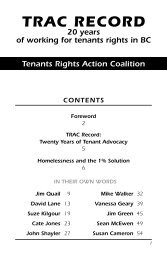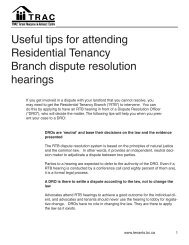Young v. Saanich Police Department, 2003 BCSC 926 (CanLII).
Young v. Saanich Police Department, 2003 BCSC 926 (CanLII).
Young v. Saanich Police Department, 2003 BCSC 926 (CanLII).
Create successful ePaper yourself
Turn your PDF publications into a flip-book with our unique Google optimized e-Paper software.
<strong>Young</strong> v. <strong>Saanich</strong> <strong>Police</strong> <strong>Department</strong>, et al Page 66<br />
the arbitrators' task under the legislation to<br />
determine large numbers of disputes between<br />
landlords and tenants, it seems likely that<br />
arbitrators have expertise in determining when a<br />
landlord's safety or other lawful right or interest<br />
has been seriously impaired by an act or omission of<br />
the tenant. Third, the purpose of the arbitration<br />
scheme in the Act must be to provide for dispute<br />
resolution between landlords and tenants<br />
inexpensively and expeditiously. Consistent with<br />
this would be a deferential approach when the<br />
arbitrators are determining questions of law or<br />
mixed fact and law within their jurisdiction. The<br />
question here, that is, whether the "safety or other<br />
lawful right or interest of the landlord" has been<br />
"seriously impaired by an act or omission of the<br />
tenant", is a question of mixed fact and law.<br />
Fourth, the decision affects the interests of the<br />
particular tenants and landlord, and is not complex,<br />
polycentric, or policy-intensive. This latter<br />
factor points toward less rather than more<br />
deference. However, considering the legislative<br />
scheme and nature of the decision at issue here, as<br />
well as the previously-decided cases on the standard<br />
of review under the Act, I conclude that the<br />
standard of review should be patent<br />
unreasonableness.<br />
<strong>2003</strong> <strong>BCSC</strong> <strong>926</strong> (<strong>CanLII</strong>)<br />
In more direct terms, I accept the CRHC contention that I must<br />
not interfere with the decision of the arbitrator so long as<br />
there was some evidence before him logically and reasonably<br />
capable of supporting his factual conclusions. I have no<br />
power to interfere even if I might have reached a different<br />
conclusion on the same evidence.<br />
[138] The standard of review to be applied to the decision<br />
of Arbitrator Katz is less deferential. In conducting a<br />
review of another arbitrator’s decision, Arbitrator Katz took











